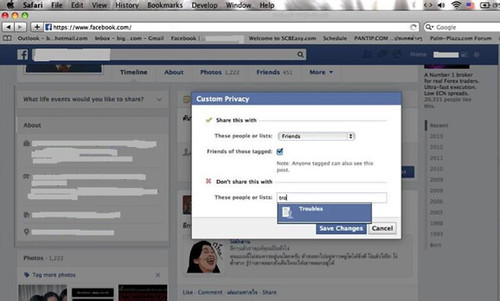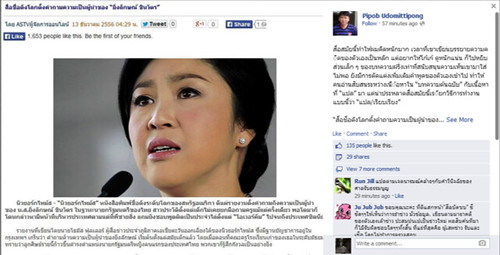Thailand has surprised the world again with the abrupt violence during the political protests at the beginning of December 2013 as pro- and anti-government protesters confronted each other on the streets leading to 5 deaths. The street fights seem to have cooled down at this moment; but the media war has just begun and will run for a much longer time.
There are two main parties in the conflict, broadly divided into the urban rich and the rural poor, who have been taking turns to protest since before the military coup ousted former Prime Minister Thaksin Shinawatra in 2006. On one side is a group of conservative urban middle class people and people from southern Thailand, the anti-government protesters. At the beginning, this group appeared to be revolutionary as they rose against government’s controversial amnesty bill and corruption. However, their current demands have developed into something unrealistic and even anti-democratic as they reject the upcoming election on 2 February 2014 and call for an appointed “People’s Council” who they believe will rule the country by virtue and clean up all corruption in the Thai political system before any election is called. Some extremists explicitly show their rejection of the commonly accepted idea of one-person-one-vote. This group has been using satellite TV channels, online and social media to call for support for almost two months.
On the other side stand rural grassroots people, some scholars and the urban middle class who abhor any unconstitutional intervention and believe that democratic elections are the way out of the political turmoil. They believe that the protesters are damaging Thailand’s democracy in the long run by rejecting the upcoming election and see the suggested People’s Council as an effort to set up a state within a state. This group of people have not yet taken to streets protests, but like the anti-government protesters, they express their political attitudes through social media.
According to Facebook statistics, around 30% of Thais are internet users and about 88% of those users use social media like Facebook. Social media is the place where they produce and share ideas, and consume and disseminate all kinds of information. Combining the high percentage of social media engagement with the hot political situation at the moment, this channel has turned into a political battleground that no one can avoid.
Journalists and media scholars have shown concern about the current social media war among Thai citizens. Ms. Pirongrong Ramasoota Rananand, Head of the Department of Journalism at Chulalongkorn University, said during a public forum on ′Thai media in times of political crisis’ that social media could accelerate political partisanship among Thai citizens.
Flaming quarrels between online users of both political sides about the current political situation are seen everywhere in social media, resulting in the act of making ‘enemies by political viewpoint’ temporarily or permanently vanish from sight by ‘blocking’ or even ‘unfriending’ them. During the past weeks, many social media users have complained about this phenomenon. People are being ‘unfriended’ by their colleagues, former professors and even close but possibly soon-to-be-ex-friends. Decades ago personal conflicts regarding political attitudes would happen during face-to-face discussions; social media today has surely accelerated partisanship to the next level.
Thais tend to be very emotional when it comes to expressing political attitudes and many do not tolerate any opposing opinions. This intolerance towards different opinions leads to selective media consumption. In spite of social media’s ability to pool and share information from various sources, some users chose to blindfold themselves and become more prone to manipulation by one-sided media.
For some people, choice of unfriending might appear as too extreme for dealing with differing political opinions and personal relationships. This group of people seeks a way to share their political opinions while at the same time trying to reduce confrontations. One of my friends who does not agree with the current protests has decided to make a ‘tailored’ list of friends who she discovers to have opposing political thoughts (she names it as her ‘Troubles’ list), not because she cannot stand opinions from other people, but rather because she does not want to be ousted by her friends when expressing her personal political opinions. “I don’t want to be put into that witch trial kind of judgement by other people.” she said. While this might be seen as the most practical way to avoid confrontation, it is worrisome that freedom of expression is being violated and self-censorship is being considered as a solution to political disagreement.

Others try to be more objective about the conflict situation. Many public figures, especially scholars, provide analysis, academic articles and studies via their online space that either support or attack the discourse and arguments from each side. Some provide a variety of news sources on the situation for comparison and links to debate forums organised by each political group are being shared. Apart from the fact that this information reaches only a limited audience who are politically very active, this method could be seen as informal education that has moved away from emotional conflict to where scholars try to generate useful academic debates and bridge the gap of partisanship by providing information and analysis. However, the information provided does not reduce the polarization of citizens’ political opinions as counter-effects could take place. Information can be distorted and backfire on the original intentions and objectives of the studies, articles and statistics.
Networks of political groups in Thailand are the main actors who use information out of its original context. A tactical approach is used to inoculate political values in their fellows as well as attack their political opponents. Fan pages are being set up to spread and circulate the latest statements of important political figures, with their gestures and quotes made into internet memes that go viral within a short period. With hidden agendas, false information is being transmitted.
Most internet users use this kind of informal information to express their political values and emotions and release political tensions rather than as purely academic information. Together with the fast flow of information, consumption and usage in the information society could backfire and more deeply polarize the current conflict.
The social media war will go on as long as political conflicts exist and the uses of social media are controversial as it can either educate and liberate or manipulate and separate citizens. It is the maturity of society that will steer the way media is used as well as the direction of Thai politics.
------
Mattawan Sutjaritthanarak earned her BA majoring in German and minoring in political science from Chulalongkorn University. Her topics of interest cover global culture and politics, LGBTIQ issues and art. She also runs a photojournalism project online called " Humans of Bangkok".




